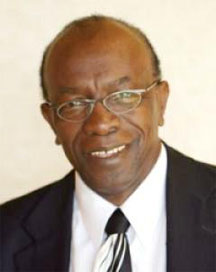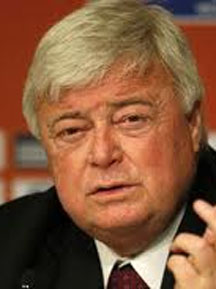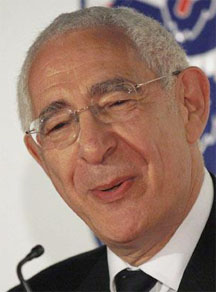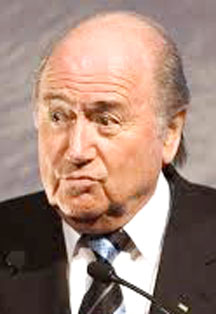LONDON, (Reuters) – Former English Football Association chairman David Triesman has accused FIFA executive committee members Jack Warner, Ricardo Teixeira, Nicolas Leoz and Worawi Makudi of asking for favours in return for their votes for England’s 2018 World Cup bid.

Triesman was giving evidence yesterday to a British parliamentary inquiry into the reasons why England failed to secure the finals which were awarded to Russia last December.
Members of Parliament involved in the inquiry also revealed the names of two other FIFA Executive Committee members who, it is alleged, were paid $1.5 million to vote for Qatar’s successful 2022 World Cup bid.
Conservative MP Damian Collins said the committee had evidence from the Sunday Times newspaper which it would publish that FIFA vice-president Issa Hayatou of Cameroon and Jacques Anouma of the Ivory Coast were paid by Qatar.
Two other executive committee members were banned by FIFA’s Ethics Committee last year after a previous Sunday Times investigation into the World Cup bidding process.

The claims are an embarrassment for the game’s governing body with a total eight of its 24-strong key decision-making executive committee having now been accused by the British media or its parliamentary representatives of corruption.
Its 75-year-old president Sepp Blatter will stand for a further four-year term at its helm on June 1 in Zurich. He was first elected in 1998. Asian Football Confederation chief Mohamed Bin Hammam is opposing him.
Triesman spoke at the parliamentary inquiry of the “improper and unethical behaviour” by the four men he named.
He said the Concacaf’s Warner asked for 2.5 million pounds ($4.09 million) to be “channelled through me” for an education centre in his home country Trinidad and Trinidad.
HAITI EARTHQUAKE
After the Haiti earthquake struck leaving that country devastated, Warner then asked Triesman for 500,000 pounds to buy Haiti World Cup TV rights.

Triesman said Paraguayan Leoz, president of South America’s Conmebol, had requested a knighthood in return for his vote while Brazil’s CBF chief Teixeira told him “Come and tell me what you have for me”.
Thai Makudi wanted control of the television rights for a proposed Thailand v England friendly.
“We had a number of conversations with Mr Makudi, telephone conversations,” Triesman said.
“These were some of the things that were put to me personally, sometimes in the presence of others, which in my view did not represent proper and ethical behaviour on the part of members of the executive committee,” he added.
Leoz declined to comment on Triesman’s claims but the CBF issued a statement in which Teixeira said he was starting legal proceedings against Triesman.
Teixeira said an English delegation had asked him for his vote in an April 2010 meeting at CBF headquarters but Triesman was not present and he told them Brazil had joined in South American support for the joint Spain/Portugal bid.
“…the president of the CBF is already taking the relevant judicial measures with a case against Mr David Triesman for the absurd comments which in truth attempt to hide his failure in leading the English candidacy since it only obtained one vote… its own,” Teixeira’s statement said.
‘TRIESMAN TRIVIA’

Warner, speaking to Britain’s Sky Sports News channel, said: “I have no intention of dignifying that piece of nonsense of Triesman who no doubt feels that he can revive his dying political career by mentioning that piece of foolishness.
“I have never asked Triesman nor any other person, Englishman or otherwise, for any money for my vote at any time.
“In the English World Cup campaign, before he was unceremoniously kicked out, I have spoken to Triesman, on his initiative, only on three occasions, while I have spoken to his other colleagues on other occasions and not one of his colleagues will ever corroborate his bit of trivia.”
Swiss Blatter responded to Triesman’s comments at a news conference in Zurich.
“I was shocked… but one has to see the evidence,” he said.
“There is a new round of information, give us time to digest that and start the investigation by asking for evidence on what has been said.
“I repeat, we must have the evidence and we will react immediately against all those in breach of the ethics code rules.”
Collins clarified the allegations against Hayatou and Anouma.
“The Sunday Times submission, and this is to be published by us later, claims that 1.5 million dollars was paid to FIFA executive committee members Issa Hayatou and Jacques Anouma who went on to vote for Qatar 2022,” he said, adding that the submission also said that Qatar employed a fixer to arrange deals with African members for their votes.
Mike Lee, who worked as a consultant on Qatar’s bid, tolf the parliamentary committee: “I personally have never witnessed any improper behaviour and have no evidence that the allegations are correct,” he said.
The vote to stage the 2018 and 2022 World Cups was mired in controversy, with England at the heart of it.
PRIVATE CONVERSATION
Triesman was forced to resign from the FA last year after a newspaper sting taped him during a private conversation claiming 2018 hosting rivals Spain and Russia were conspiring to bribe referees at last year’s World Cup in South Africa.
A FIFA investigation found no substance to those allegations by Triesman.
FIFA banned Nigerian Amos Adamu and Reynauld Temarii of Tahiti, president of the Oceania Football Confederation, from its executive committee in November over a report in the Sunday Times that they had offered to sell their votes.
When England’s bid failed last December, receiving just two out of 22 votes, it sparked bitter recriminations and Roger Burden, the acting FA chairman, stated that he could no longer trust FIFA members and withdrew his candidacy for the job.





